#comics aren't that complicated i promise
Text
Sometimes fanon damian wayne makes me want to bang my head against a wall cause he is literally so boring??? like he has no personality, no sense of humor, no hobbies or interests. Of course aside from either being a raging ahole who has no manners, is crazy aggressive for no reason at all times, acts entirely on evil impulses, and loves to stab things (and therefore can not have any skills, capabilities, or activities outside of stabbing things and behaving inappropriately in public spaces); or loving animals so much that he does nothing but love animals and constantly adopt every creature he sees even if they already have a home and he always breaks into every zoo to free all the animals and he never does anything but cuddle with his 70000 pets (and of course they always think his love for animals doesn't come from the al ghuls, the al ghuls are evil and hate animals and never let him have pets, in fact he would have been killed for it). like PLEASE bffr, have y'all ever read a comic? ever? y'all are making him so incredibly bland.
However on the flip side of that, i do recognize how when writing large groups, like the bats, characters tend to get boiled down to one note in order to fit everyone in and make them distinct, but i'm not gonna lie its painful to read sometimes.
#damian al ghul#damian wayne#canon vs fanon#batfam#batkids#this one sounds extra mean#sorry about that\#again this is not edited or anything so its gonna be rough#also if fanon is just like your space than that's chill#you do you#but also like#there is source material that is a lot of fun to read sometimes if you wanna get into it#comics aren't that complicated i promise#also this is an issue that i see most often amongst coffee lover tim fans#they usually hate damian
41 notes
·
View notes
Text
Dude.Losing it. From the beginning, Snyder fans and Joker Fans have been telling you to build a whole Elseworld Story verse where directors can do whatever they want but now it's not a reboot but nothing is canon until your own movie? Why are they still letting that idiot talk???
#Lmao#Nerds are really going to let that scab get away with anything#Idiots#Dude I promise the comics aren't even this complicated#At least I know which stories are black label or not#like damn
7 notes
·
View notes
Note
"A deuteragonist has a very different role in the MHA and that is a whole other post ."Can you please write this article? I am tired of Bakugo being constantly downplayed. There are very few people who understand his character and role in the story as well as you do.
Haha I mean hehe it's just hoho I never said fufu that Katsuki is the deuteragonist guffaw shucks haha I mean come on snort why are you putting words in my-
Katsuki Bakugou is the deuteragonist.
Katsuki Bakugou is the deuteragonist
Katsuki Bakugou is the deuteragonist
"Of course you would say that. You're a Katsuki Bakugou stan! You are invested in inflating his importance in the story because you love him." - some people, probably
No. If that were true, I would be arguing Katsuki Bakugou is the protagonist. But I'm not.
Because Katsuki Bakugou is the deuteragonist.
It's not that I love him and therefore assert that he's the deuteragonist. I love him because he's the deuteragonist (plus many other reasons). He is an archetypal familiar shounen hero made interesting in part by the fact that he is NOT the protagonist and deliberately written in the deuteragonist role/function, and I will go into visceral detail about this momentarily.
I promise you I don't go around in other fandoms arguing my favorite non-main character is the deuteragonist. I fully embrace whatever role it is they play in the story. YOU WILL SEE THE EVIDENCE OF THIS VERY SOON, FOR EVERY CHARACTER IN MHA.
What is a deuteragonist?
A deuteragonist is a story archetype. They are the second-most important character in a story (which is a vague as hell definition). They are often known as the "secondary main character."
That's it. Everything else one might say about a deuteragonist is just a sub-archetype.
A deuteragonist can be a sidekick, a love interest, a rival, an antagonist, or even a neutral party. They are often, not always, written as foil characters to the protagonist. They often, not always, provide a different and yet similar outlook to the protagonist's. Their utility in a story can be quite varied. Sometimes they support the protagonist, and sometimes they oppose the protagonist. Often, they are used to help the protagonist complete their character arc.
Sometimes, there can be more than one deuteragonist.
What the hell is a deuteragonist?
The problem is, the function of a deuteragonist can change just depending on the type of story we're talking about. A deuteragonist in an ancient Greek tragedy (theatre), where the term originally came from, won't necessarily function the same way as a deuteragonist in a 2-hour contemporary movie. Things get even more complicated when we're talking about a TV series, a book series, or a comic book series in which the cast becomes so large we're likely to see MULTIPLE deuteragonists.
My Hero Academia, like many long-running shounen manga, has an ensemble cast. Would you be surprised if I told you My Hero Academia not only has multiple deuteragonists, not only has multiple antagonists, but also has multiple protagonists? Because it does!
Sometimes people wanna divide MHA into three or four acts and make the claim that the deuteragonist changes from act to act. I say they aren't going far enough. MHA is divided into arcs, and each arc has its own protagonist and antagonist and sometimes even deuteragonist. This is a STAPLE of ensemble cast shounen manga, where often there will be so many characters they get grouped off into trios (or more) and one among them will be the group's designated protagonist.
Sure, in most MHA arcs, Izuku is the protagonist. But he's not always. Who is the protagonist of the Pro Hero (Endeavor vs Hood) arc? Who is the deuteragonist? It's not Izuku and Katsuki; it's Endeavor and Hawks! What about the protagonist in the My Villain Academia arc? Tomura. The Hero License Supplementary Course arc? Katsuki and Shouto (who can't seem to decide if they're co-protagonists or protagonist and deuteragonist and who is which). The Overhaul arc? Izuku is the protagonist and Mirio is the deuteragonist. Some arcs really play with these roles or make it unclear who is playing which role or if the role even exists.
What is a deuteragonist in My Hero Academia?
So if we have a bunch of protagonists, does that mean the most important one is the series' overarching protagonist and the one second in importance is the deuteragonist? It COULD be, but it's not necessarily true.
There aren't that many arcs where Izuku is not the protagonist. If we look at the number of arcs where someone else is the protagonist, following the above logic, we could end up with All Might or Endeavor as the deuteragonist. Maybe some people would earnestly make the argument Endeavor is the deuteragonist--I don't know, I haven't met those people I guess. The problem with this approach in my eyes is that it entirely discounts the deuteragonists of each arc. Would it not follow that the overarching deuteragonist is the character who has played the deuteragonist in the largest number of arcs? What if that character is different from the character who has played protagonist the second-most number of times? And this is to say nothing about if the protagonist or deuteragonist are the same as the antagonist in a given arc! It's difficult to weight any one character in this fashion particularly when you have an ensemble cast.
This is getting into the question of focus and screentime. How much should we weight this metric? Admittedly this one can also be complicated, especially when it comes to long stories with ensemble casts. The question is how much does screentime actually convey how much a character is the focus of a story, and does that necessarily translate to protagonist and deuteragonist? Because for many the question is: could the deuteragonist be an antagonist in MHA?
It just gets a little harder to argue someone besides Katuski Bakugou is the main deuteragonist the more Katsuki's screentime allocation looks something like this:
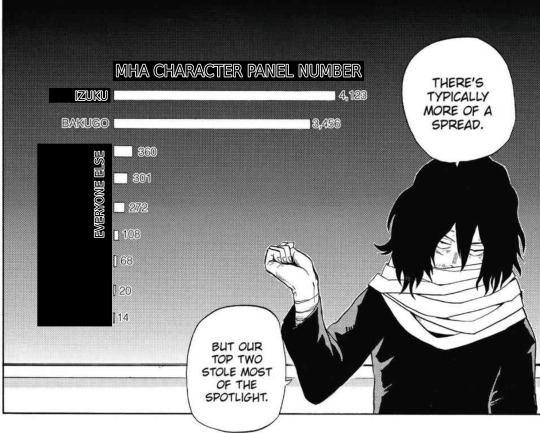
Okay, perhaps that exact size of gap is hyperbole. But there is a clear, measurable gap between Katsuki Bakugou and everyone else and I don't think anyone has ever disputed that. Please check out this post by @dekusheroacademia that has compiled some of these statistics (they also make some excellent points about evaluating the elements of a deuteragonist and how various characters fit or don't fit those characteristics).
Still, this is merely supporting evidence, not conclusive. I am well aware of the concept of a false protagonist, where someone appears to be the protagonist until later someone else is revealed to be the story's true protagonist. And while I've never seen a false deuteragonist where someone SEEMS to be the deuteragonist and is later revealed in a twist not to be (as opposed to the deuteragonist just merely changing NOT as a deliberate twist where expectations were set to be otherwise), that doesn't mean it can't happen.
Tangentially related, we could also potentially look at marketing as another piece of supporting evidence. It's not conclusive that just because Katsuki Bakugou is one of the most merchandised characters in the franchise that he is more important to the story than those who aren't, but it's still notable supporting evidence. After all, based on Horikoshi's marketing of his own story i.e. who he draws in which orientations on chapter and tankoban covers, or how he lists characters on character intro pages, we could easily come to the conclusion as casual readers that Izuku is the protagonist. There are many cases where one could conclude Katsuki is the deuteragonist based on such presentations alone. But again, I concede this is not conclusive.
So, if we set aside individual story arc roles, screentime, and marketing, what does that leave us with?
What is THE deuteragonist in My Hero Academia?
Even if we can determine Izuku Midoriya is THE protagonist of MHA based on things like the number of times he's protagonist in story arcs, his screentime, and marketing, I'll set those aside for the deuteragonist and see if there's something else that can help us here.
What element are we missing? The overall story.
Sure, we can break down the story into arcs and assign deuteragonists that way, but that's not getting us to THE deuteragonist. So let's start with the protagonist. How do we know Izuku Midoriya is the protagonist of MHA without considering the previous metrics? The way the story focuses on him. It is easy enough for anyone to recognize the characteristics of a protagonist in him from a functional perspective. He is a POV character. We hear his thoughts. He narrates the story. We see the story over the timeline of his character growth. His character arc coincides with the overall story themes.
I've talked many times about how My Hero Academia at its core is a story that explores the question: what is a hero? MANY characters explore this question, but the character who compiles these answers together and rounds them all out and grows and has his perspective change and exemplifies the moral is: Izuku Midoriya.
So let's go back to the functional elements of a deuteragonist. Remember those sub-archetypes? Well, in a shorter story with no ensemble cast, what do a sidekick, a love interest, a rival, an antagonist, and even a neutral party all have in common? They are defined by their relationship to the protagonist.
You see, in a story where all the characters interact with each other and converge on the major theme of the story, ALL characters are defined by their relationship to the protagonist. But in particular, the function of a deuteragonist is to supplement the story with what the protagonist needs FUNCTIONALLY. When is a sidekick the deuteragonist of a story? When the story focuses on the adventures of the protagonist and their sidekick. When is a love interest the deuteragonist of the story? When the story focuses on the developing relationship between the protagonist and the love interest (i.e. the romance genre). CAN a story with a love interest deuteragonist focus on their adventures and individual character development too? Yes, but sometimes the result is that the love interest is ALSO the sidekick...or the rival. When is the rival the deuteragonist? When the story focuses on the clash and growth between the rivals. When is the antagonist the deuteragonist? When the story focuses on the battle between them. NOTE that when I write this, I don't mean it focuses on the protagonist's adventure that culminates in them meeting the antagonist at the end for a battle. I am talking about when the BATTLE ITSELF is the main focus of the story. See stories like Silence of the Lambs or Death Note for a clearer example of what I mean, where the focus of each is on the psychological games the protagonist and antagonist play with each other. The point is, the story on a structural level, on a meta level, has to focus on these sorts of interactions to determine its deuteragonist.
Obviously this gets more complicated with a large story and an ensemble cast because you could have bits of the story where the structure changes and seems to focus on new things. That's why I pointed out that the more immediate protagonist and deuteragonist and antagonist often change in MHA depending on the story arc.
When I try to determine who is THE deuteragonist of the entire story, I have to look at the entire story. I have to ask myself what the story is about. So what is the story about? What is MHA about?
If you said MHA is about Izuku falling in love with Ochako, I'm sorry but you're wrong.
If you said MHA is about Izuku taking on All Might's mantle, I'm sorry but you're wrong.
If you said MHA is about Izuku defeating/saving Tomura, I'm sorry but you're wrong.
If you said MHA is about Izuku rekindling his friendship with Katsuki, I'm sorry but you're wrong.
MHA is about Izuku Midoriya (and most everyone else) learning what it means to be a hero.
It's in the fucking title. MY HERO ACADEMIA. The story is about Izuku's education (as it takes many forms) to learn what it means to be a hero.
So who is the deuteragonist in the story about Izuku Midoriya learning what it means to be a hero? The character who is second-most important in how Izuku Midoriya learns what it means to be a hero.
A lot of characters do teach Izuku Midoriya what it means to be a hero or at least some piece. But who is MOST IMPORTANT?
See, My Hero Academia is LONG. If we just focus on the parts of the story in which Izuku tries to learn from All Might or take on his mantle, we lose ARCS of the story. The same is true if we focus on his love life, or his rivalry with Katsuki, OR EVEN HIS BATTLE WITH TOMURA AND ALL FOR ONE. In the case of the latter, we're basically excluding HALF the story: the school arcs!
MHA is structured such that it alternates between what we colloquially refer to as "school arcs" and "villain arcs." And while exploring the question of "what is a villain?" is an important subset of the main theme, it is not the entire story. You can't just label all the school arcs as "filler" (because they're not) and chuck them out. Each story arc contributes to the lessons Izuku learns and the theme of the main story.
I can think of something every character teaches Izuku with respect to this theme. I can think of a lesson Izuku has taken away from every encounter and every story arc. But who ELSE is present in nearly every story arc? Who represents the foil to Izuku who allows us, the audience, to learn alongside them what it means to be a hero? Who learns the bits Izuku does not need to learn because he already exemplifies those answers in spades? Who represents the other half of the hero equation that Izuku is missing? Who has his own blanks filled in by Izuku himself? Who has played all the sub-archetypes of a deuteragonist for Izuku Midoriya, including antagonist, rival, sidekick, and even arguably love interest (replace with platonic interest for the rekindling friendship angle if you want so we don't have to go into that whole thing here please, I'm talking about the generic structural elements within a story more than anything)?

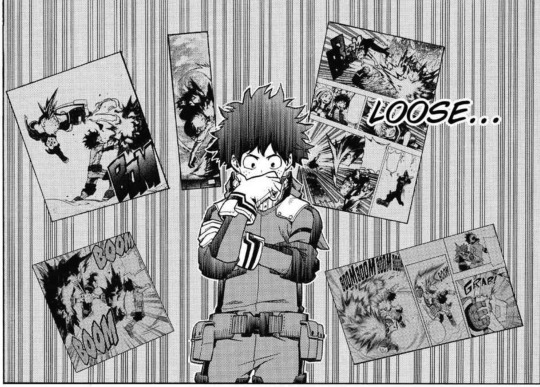
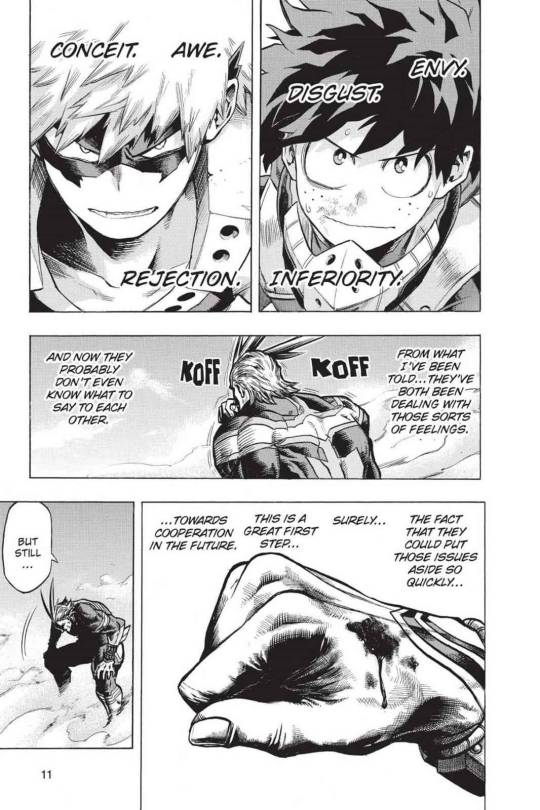
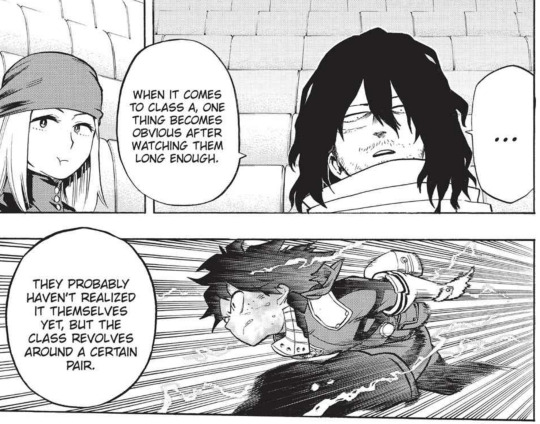
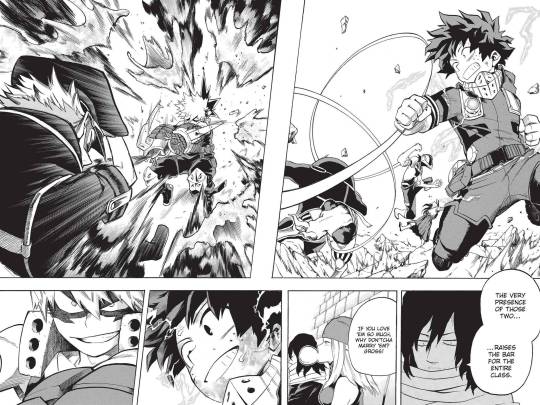
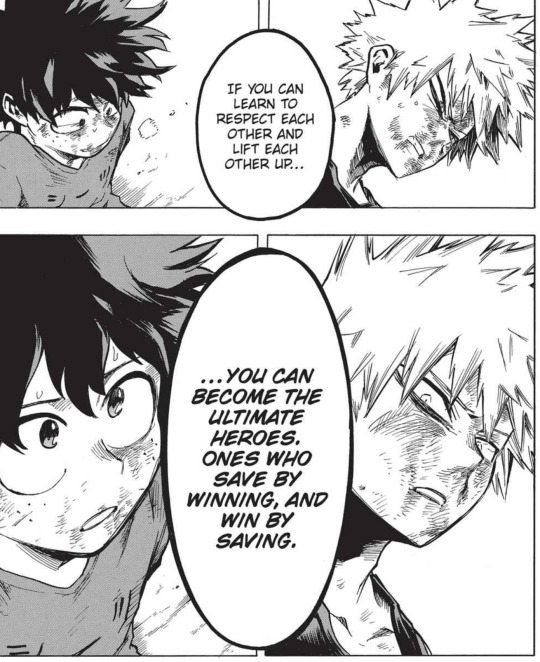
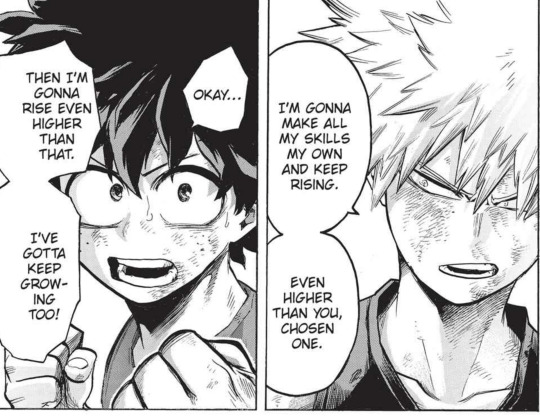
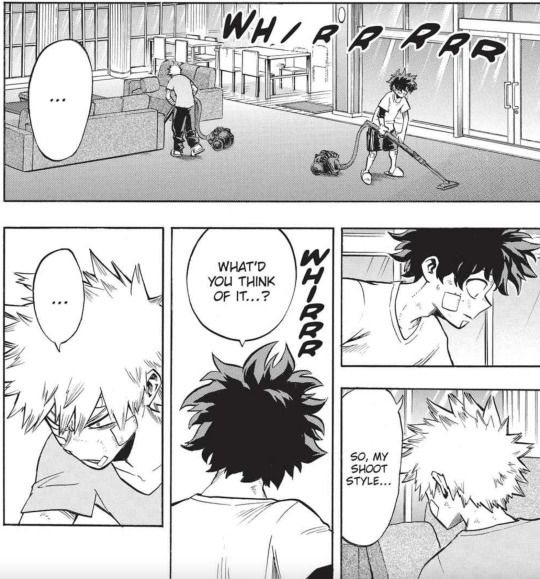
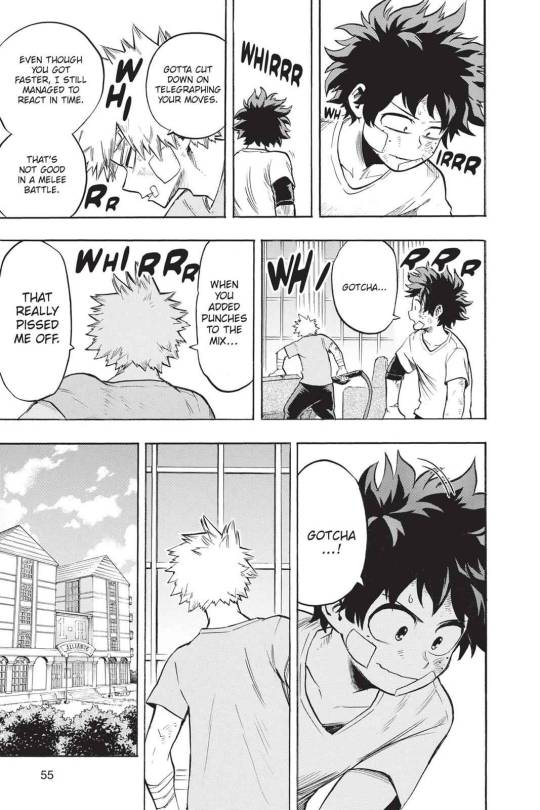
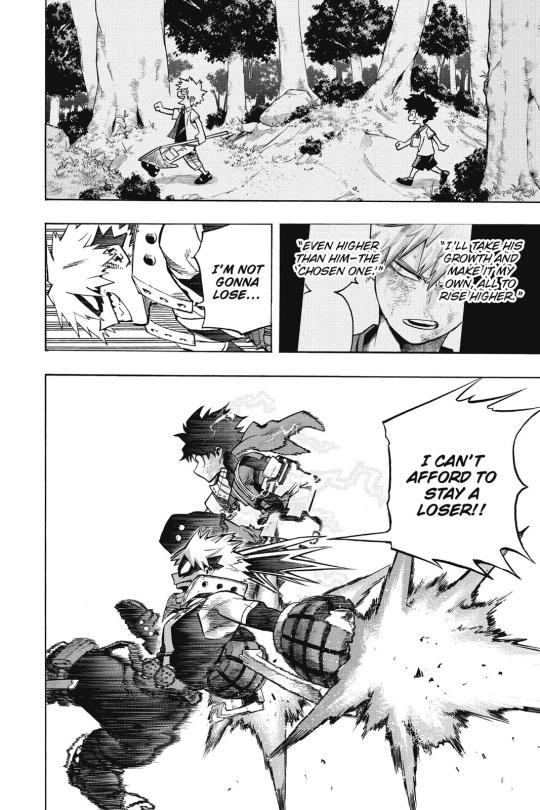
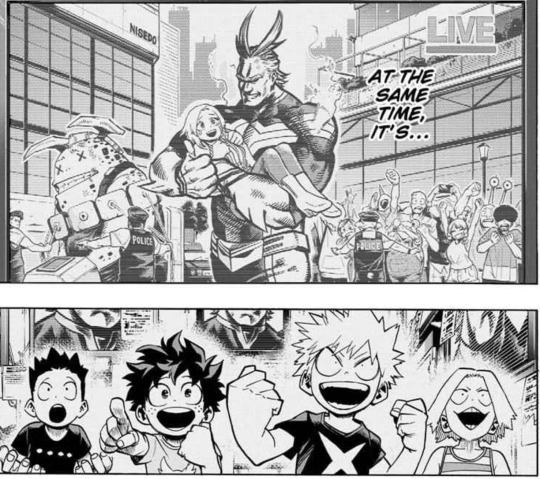
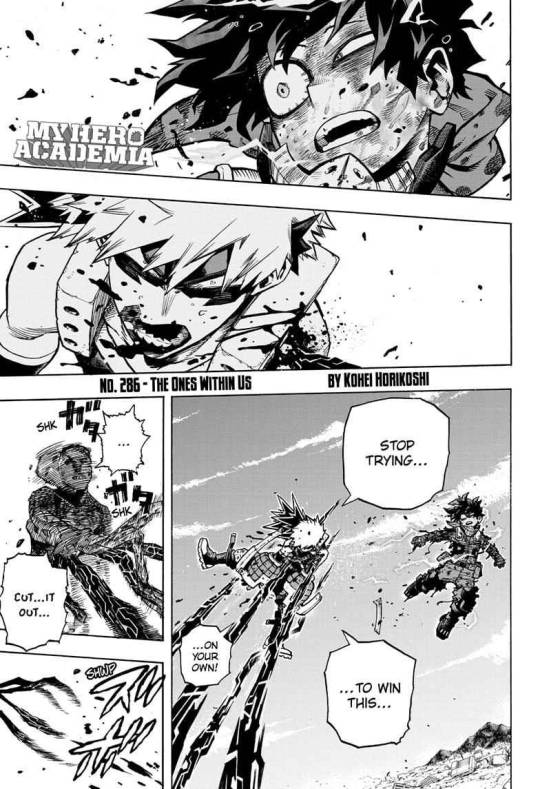

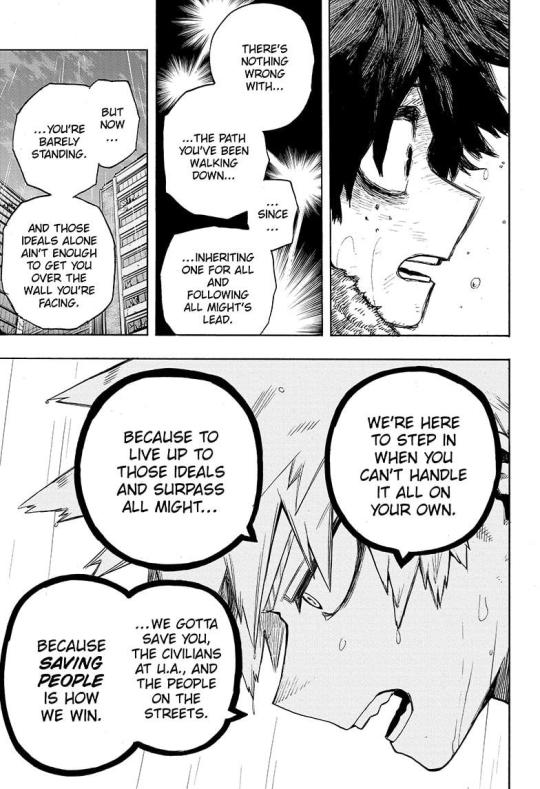
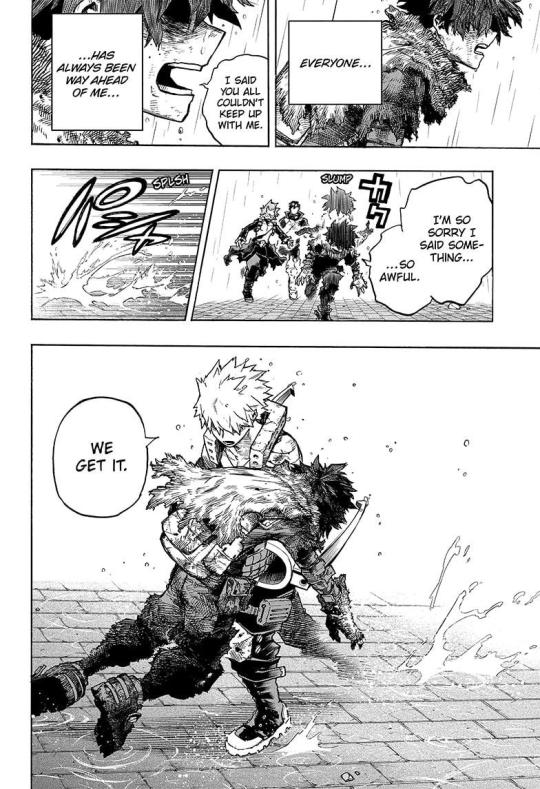
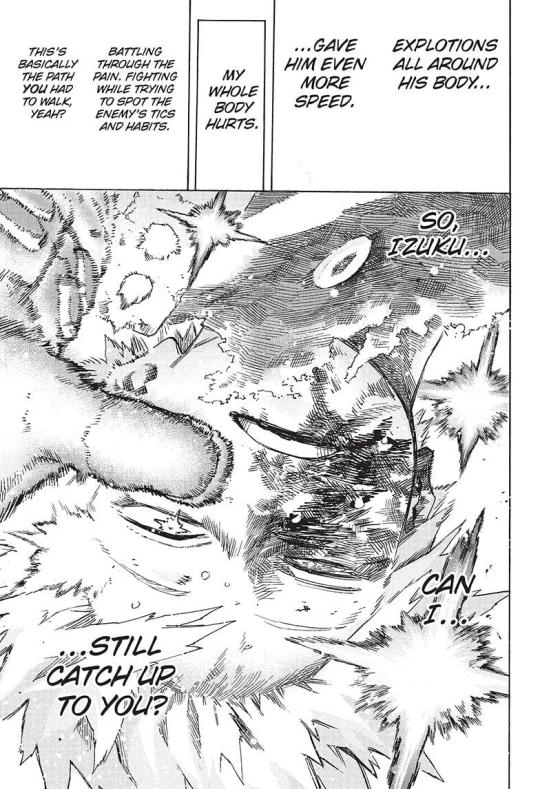
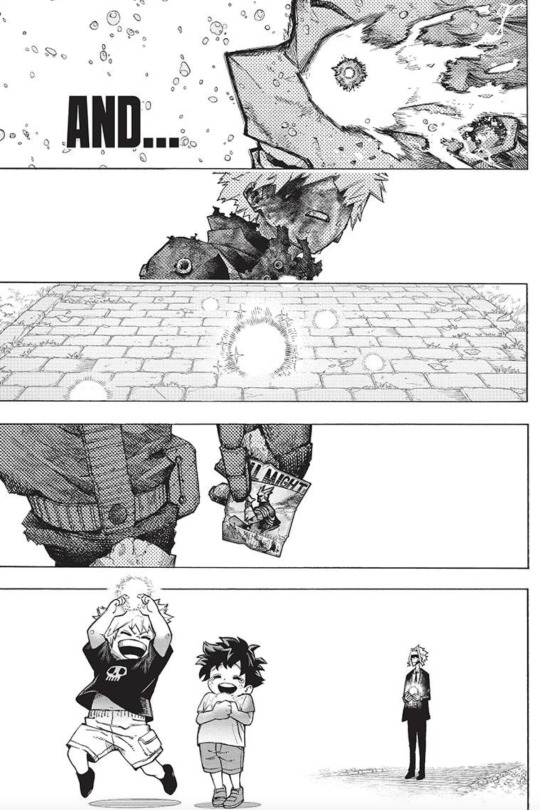
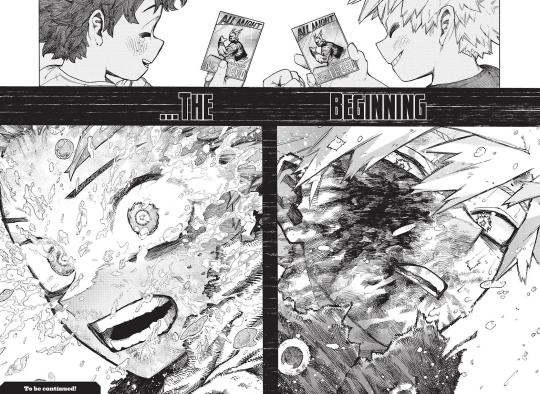
Izuku Midoriya cannot possibly have learned the fundamental lessons of what it means to be a hero without Katsuki Bakugou's character arc to supplement him. Katsuki Bakugou is an irremovable, integral player in demonstrating the theme of collectivism that informs the main story, not just for Izuku to learn it but for THE AUDIENCE to see it too. He is one half of "win to save, save to win." He is the standard shounen manga archetype who has to learn the value of teamwork/collectivism so that he can teach it to Izuku Midoriya and save him from himself. The story is structured in such a way that it resembles LESSONS for the characters to learn, and Katsuki's "education" in this respect is VITAL to the story, second in importance only to Izuku Midoriya's.

P.S. Is it actually taking away from Katsuki to call someone else THE deuteragonist?
Yes. I know some people don't want to have to say it that way, but it is. Based on a number of metrics, Katsuki Bakugou is most widely recognized as the deuteragonist. If there's a default answer to the question of who is the deuteragonist but you think the deuteragonist is someone else, then in order to be persuasive you must not only argue why you think your chosen character is the deuteragonist but why Katsuki Bakugou is NOT the deuteragonist. If you want to argue someone else is the deuteragonist, you are taking on that onus, that burden of proof. You have to disprove Katsuki Bakugou is the deuteragonist.
Are there other characters who fit the deuteragonist function at times? Yes! There are multiple deuteragonists! But if in spite of the multiple protagonists we're still able to call Izuku Midoriya THE protagonist of My Hero Academia, then we are absolutely able to call Katsuki Bakugou THE deuteragonist as well.
tl;dr MHA is about learning what it means to be a hero and Katsuki Bakugou's story is second-most important to that theme, which makes him the deuteragonist
#anon ask#ask pika#my hero academia manga spoilers#final showdown spoilers#katsuki bakugou#meta#deuteragonist#now just because i care does that mean i actually CARE?#no not really#think what you want you aren't doing anything to ME
116 notes
·
View notes
Note
If you had your say, what villains would you want featured in future venom movies?

With the stuff they have the rights for and aren't saving for future/solo movies, within Venom characters, who is there to pick from? They did the Future Foundation for the first movie, they got to Carnage in the sequel, they've set up Pat Mulligan/Toxin and we're probably gonna either get that or Knull in the next one. They can't scale down to one of Spidey's billion crimelords or someone like Sin-Eater who at least kinda has something to do with Venom, they've set up world-threatening symbiotes as the baseline. Toxin is just nothing, there's nothing there, the most you can get out of him is by having him be We Have Spider-Man At Home, and they already set him Mulligan as Venom's Javert. Combine those two, pit Eddie against a jerk Spider-Man who goes Carnage sometimes, I guess it's something? Knull is a Thor villain who took the wrong turn at Albuquerque, I can't imagine how they'd do him for these movies without just pulling the trigger on a Venomverse outright, and there's been a lot of talk about how the next movie's gonna set up that, or a multiverse, or the Sonyverse, and I'm boring myself to sleep just talking about this.
They both suck and are big idiot nothings, and none of the prior guys were really good to begin with. Knull is a little more tolerable in my book because Al Ewing and the new game made decent enough soup out of it and Tradd Moore's art sold me on him a little bit, and Woody Harrelson playing Biff Tannen was by default the most entertaining Cletus Kasady has ever been aside from AXIS, but "occasionally amusing" doesn't equal good or even mediocre, and that's the issue with these movies in a nutshell. An occasionally funny schlub protagonist and offscreen promises can't make up for all the crap everything else, and Let There Be Carnage wore my goodwill towards even that real thin. I really did try to like it.
Don't get me wrong, I like that those movies exist. I'm still probably gonna drag my friend into the next one. I hate most Venom comics but I'm incorrigible Venom trash. If we have to put up with those films and a Madame Web every now and then as the price to pay for Sony keeping the rights and keeping Spiderverse and the games just as they are, then by all means keep them coming. But man, I did try, I seriously combed through Venom and the other symbiote's rogues galleries and supporting casts to try and find an answer for this, and all the characters I found were A: dogshit Venom / Spider-anciliary characters that don't have much of anything worth it to them, and B: halfway there Spider-Man leftovers who are better served just not having anything to do with Venom movies, so I guess the option I'd go here is for them to just make new ones. I mean, movie Carlton Drake was basically an original character and he was, okay I don't even remember a thing about that guy but he was probably better than Cletus because it's really not that hard to come up with a better villain than Cletus Kasady (who at his best just elicits a chuckle) and dirtbag CEO with the cops on his side is the kind of thing you want a character like Venom to be fighting so, I guess lean more on that.
I guess I'd put Venom against symbiote tech cops that he can kill and eat without complication and have those follow him around while the actual plot is about some dumb errand or personal conflict he runs, but I don't think the villains are really the missing piece here. Venom is a terrific Spider-Man villain, but as a protagonist he is frequently deeply lacking, and as a movie franchise has like two things going for it, the titular character and the humor of a couple low-stakes absurd comedy scenes like the lobster tank, so I'd take those and throw the source material in the trash and have them go through something like the fake sequels of 22 Jump Street, just put the character in dumb problems that they can try and solve in dumb ways and do their dumb comedy routine in, Venom as a vehicle for dark parody as an extension of what he was made to represent. Treat the movies less like they are steps in a cinematic universe or character pieces and more like genre films that get infected and corrupted by a monstrous violent walking alien apocalypse and the schlubby journalist meathead in a co-dependent relationship with said walking apocalypse.
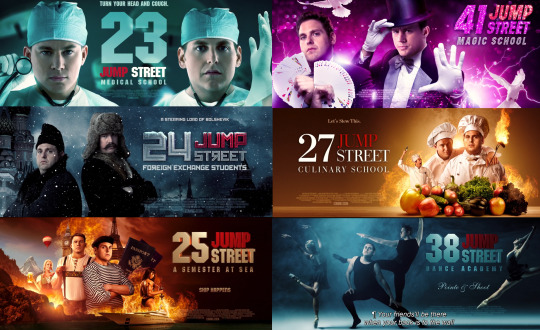
Venom In Space. Venom Goes to Hollywood. Venom In The Hood. Venom Surfs The Web. Everyvenom Venomwhere All At Venom. Not even joking, if I could make a Venom musical / Little Shop of Venoms I'd do it in a heartbeat, and it would end with similar destruction. Because make no mistake, this is a Laurel and Hardy thing only to them, and to everyone else it's an escalating horror film with some kind of destruction left at the end, because that's what happens when Venom runs rampant and Spider-Man isn't there to stop them or at least keep them in line.
Venom is not just a parody, he is a rot at the heart that never stops growing, and even if Eddie Brock can strive to be a better man and even be a decent one, even if he and the Symbiote can bond as losers trying to be better, neither can escape the nature of what Venom fundamentally is, with a million new Carnages and Riots and Agonies and Screams and Viruses and symbiote cops and serial killers popping up every minute as a reminder. You can't really come up with a Venom-specific villain that's going to be greater than Venom himself already is as a Spider-Man villain, so I'd just lean into that. And then maybe, when and if it's time to finally deliver on that Spider-Man or Sinister Six encounter, they find themselves arriving too late after we've had enough movies to laugh at this idiot schlub and his predatory living cancer buddy while the world they've been protecting has been turning more into this. We put this world not in the hands of Spider-Man, because we have the full rights hope in overcoming hardship to be our better self, but in the claws of Venom, because we are fucking stupid.
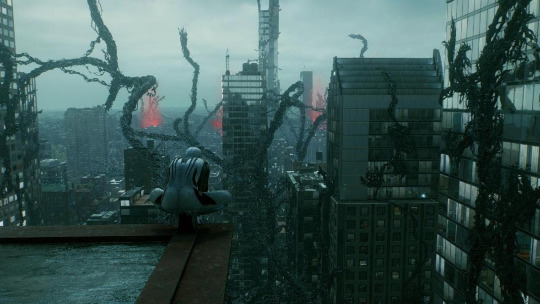
#replies tag#marvel#spider man#venom#eddie brock#marvel comics#superheroes#supervillain#comic books#sonyverse
20 notes
·
View notes
Text
On the last day of summer vacation... The Writer and His Muse
Full disclosure, I wrote another version of this last night. It was... factually correct. But it just wasn't good. So I saved it and took a few steps away and realized what I was supposed to be writing. I apologize now this is going to be long.
When I came up with the idea to write this series, I wasn't sure of the structure. If I'm honest, I still don't know lol. And after being called the "Riverdale Analysis Auteur" (thank you @storkmuffin ❤️), I promise to do the utmost to put forth only my best for you. There isn't going to be an uploading schedule so follow the tag "Code Word Jeronica" to see when I post.
My intention with this is to show that from the pilot there has always been the opportunity for Jeronica. I know what you're saying "there's an opportunity for ALL pairings."
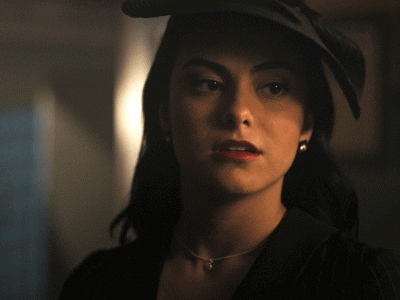
And, yes, while you are correct. There were some possibilities that were more feasible than others (Sorry Jarchies!). For the skeptics out there, the showrunners did chemistry tests with so many pairings. Cole even admitted that he did one with Cami and he was open to a Jughead/Veronica relationship "It's the CW, anything can happen"! Coding isn't always intentional or needs to be taken seriously. And that's okay. As a writer myself, I understand the "side character curse" all too well.
With all of that being said, I will only be focusing on the evidence we get in the show itself. I may reference the comics sporadically (like how Jughead and Veronica have been paired up/dated several times in the comics, throughout the comic's history. Below is a picture from Pep #154 in 1962!) but I'll never reference anything outside of the source material as evidence.
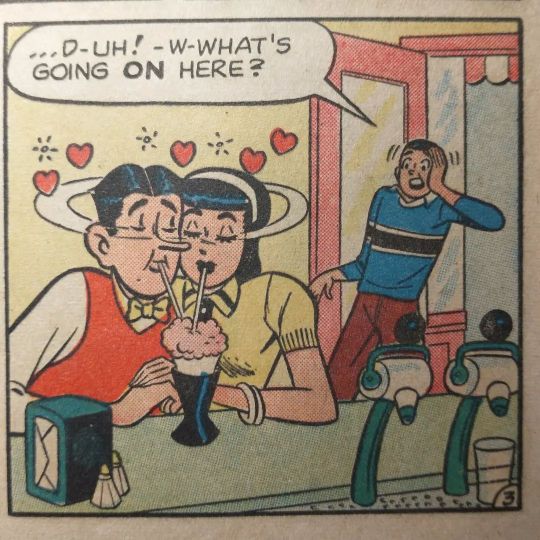
The Writer and His Muse
It's established from the pilot that Jughead is a writer, an aspiring novelist. All writers need a muse. Something that inspires them to put pen to paper. In Greek Mythology, Muse was a Greek Goddess who gave inspiration to all. Often, a muse is referred to as a beautiful woman but it can be anything. The show Riverdale is the muse for fanfiction writers who write in the universe. Jughead has several muses throughout the show. He goes through various tribulations with his writing. We see him suffer with writer's block, make a deal with the devil (both Jugheads in Rivervale), and we know that the story that put him on the map was a telling of him and his friends.
In the overall show we know of five big stories that Jughead writes. Jason Blossom's murder, The Red Dahlia, Killing Mr. Honey, The Outcasts, and Bend. Towards. Justice. All follow a pretty basic plotline. Something happens, a group of teens have to investigate, there's a surprise twist, and then a resolution.
But, through all of these he has one muse that is constant. Would you believe me if I told you it was our fair Veronica? Because it is. Before you ask "What about Betty?", let me ask you the same. What about her? She is a character in his stories. Sometimes she's the main character. But being the main character and being a muse are two very different things. Veronica's presence in his stories symbolize different major elements to a story. More than any other Riverdale character.
Throughout the series we see Jughead struggle with his writing. His father tells him to keep writing as a way to get out of Riverdale and not get caught up with the Serpents. We see him have profound writer's block, plagiarize another author, change the way he writes due to his disability, and physically lose his ability to write. His writer's block, and the complications with it, start in season 5 and aren't resolved until season 6.
Here's an unexpected bonus from helping Veronica...
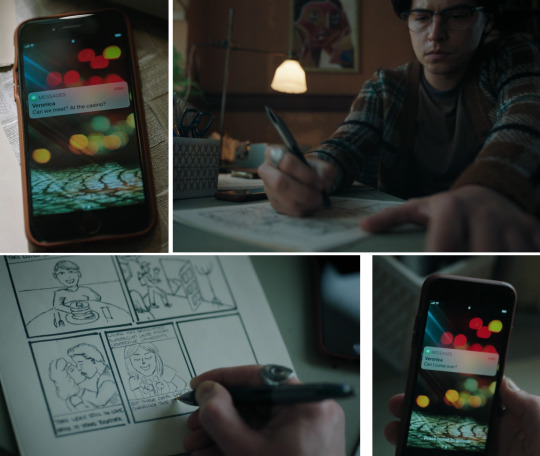
...I started writing again.
She is, and has always been, his muse. This is the first time he acknowledges it, but the clues have been there since day one.
Jason Blossom's Murder
The first story begins with the pilot's very first scene. It also introduces the audience to a concept called "The Center of a Story". The center of a story is just how it sounds. It is the element that brings everyone together. However, while this can be the main character and what that character goes through, it can simply be a person or place that has very little interaction at all with the main story. In a murder mystery, which Season 1 is, the center of a story can be the murder victim. In telling that story we can either have flashbacks of the person's life up until they are killed; or, they are simply the reason why everyone comes together (and not even just to find out why. Sometimes the why isn't necessary).
Jason Blossom is the center of the story. It's all about finding out who killed him. But the muse of the story? The hook? The character's entrance that actually connects everyone together? That's Veronica. "On the last day of summer vacation, a new mystery rolled into town." Jason's murder is the B-plot of the season. It might have kicked everything off, and the action might be connected to him, but it's not the entire reason why Jughead is writing this book. In fact, the opening soliloquy says:
Our story is about a town, a small town, and the people who live in the town. From a distance it presents itself like so many other small towns all over the world. Safe, decent, innocent. Get closer though? And you start seeing the shadows underneath. The name of our town is Riverdale.
The story was never about Jason Blossom.
The Red Dahlia
I'm not going to touch on this much, because I have a whole post planned just about this episode. But, I want to point out that out of all of the stories we see him write, this is the only story that focuses solely on one character. It's completely about Veronica. She, like Jason, is the catalyst. The difference is that, unlike Jason, she plays a major role.
Killing Mr. Honey
In his last story to submit to the University of Iowa, it's about how seven teenagers try to get rid of their unethical and overbearing principal. We have known up to this point that Jughead loves horror. He likes to write "Lovecraftian" style stories. The difference between the two are HPL rejected morality. He considered himself a "Morality Atheist". Jughead, on the other hand, loves morality tales. (In 1955 there's a whole episode about it.) This is most evident in this telling. Each character represents an architype. Veronica, arguably, is the most important architype. She represents morality. She's the only one who really challenges what they are doing. Specifically, Jughead. At face value someone can go "Well, Jughead and Veronica aren't friends so it makes sense". First off, no, they very much are friends. But, second, if they weren't, why put her in such a place of honor. In actuality, given his character in the show (and the comics), Archie should be the moral compass of the story.
The Outcasts
The Outcasts is really the only story that we have very little knowledge of. I freely admit that for evidence, it's the weakest of the five. It presents coded details for the audience to infer their meaning. Jughead is the Viper Leader, the Serpents are the Vipers, but is Betty The Homecoming Queen? Most likely. The co-ed he takes home tells him that he wrote a "very sexy book" in regards to the Viper Leader and the Homecoming Queen. However, in his drunken voicemail, he lambasts Betty. One line in particular stands out "You're a cold, fake, duplicitous bitch. And once people read my book, everyone's going to see that". Now, we don't know what is in the book (Kind of wish they'd released it) and it could end with the Homecoming Queen cheating on the Viper Leader with the Football Captain (I'm inferring that that would be Archie's character). Or, they could have lived happily ever after. Or... using the ambiguity to stretch the possibility... the Homecoming Queen could have been Veronica.
Why? Well, there's a reason why the Enemies to Lovers trope is so popular. What better way to get back at your ex for cheating but to immortalize their best friend (who was also cheated on by your best friend) as the true-love-fairy-tale-princess of your wildly popular NYT best seller?
Bend. Towards. Justice.
The last story we see Jughead write is when they've been taken back to 1955. 7x01 is very reminiscent of the pilot. But, for Jughead and his writing, it's always been in the details. Season 7 is my favorite season, and trust me, I have a lot to say about what happens. So, I'll keep this brief. Even when he describes Tabitha it's very factual. There's no emotion. He lists who she is and the reason why she might know what's going on. Please don't take this to mean that at this point he isn't still in love with her, because he very much is. When he sees her, he doesn't know the 1955 version isn't his girlfriend. He keeps all of his emotions bottled up until he can figure out a plan. And to spare her from any craziness because her memories also might be gone. Up until this point, everyone's description is "This person is here, and this is who they are". Including himself.
For starters I live in an abandoned train car with Hot Dog which... actually tracks... Betty and Kevin aren't merely friends, they're dating. Cheryl's twin brother is alive, but he's not Jason, he's Julian. No sign of a Reggie yet. But Archie exists and he's pretty much a teen Charles Atlas... I've been waiting to reconnect with the one person who might shed some light on our predicament because she was both Chronokenetic and the town's guardian angel. My girlfriend, Tabitha Tate.
He mentions that all of this information is "overwhelming, heartbreaking". But he doesn't say why because there are many reasons why. His best friends don't remember anything. Do they even really know him? With one one question he realizes that the person he loves doesn't love him back. But he breaks this way of introducing the "characters" when he introduces Veronica. It's all emotion. There's even a sexy jazz trumpet riff announcing her.

"Damn..." His thoughts whispered to him breathlessly. "Even in 1955, Veronica Lodge still knew how to make an entrance." He goes from boredom to attention. He straightens his shoulders, he sits up to see her better, and he doesn't blink. Like everyone else, and very unlike him, his whole attention is on her.
THE PILOT
Now that we've gone through the five major stories we know he writes, let's go back to the end to see the beginning. The last episode of the entire series ends with a typewriter. All of the stories mentioned above are stories written within the main one. Riverdale itself is a story (possibly Archie Comics fanfiction) written by Jughead.
The pilot itself, as all TV shows, has a narrative woven throughout. There's characters, conflict, plot, etc. Though the episode opens with Jason's murder the pilot was never about that. Hell, Jughead is barely featured in it. We see him two significant times. The first time is two minutes in, where he's drinking his coffee writing his story. And he says the classic line, "We were still talking about the Fourth of July tragedy on the last day of summer vacation, when a new mystery rolled into town." We are introduced to Veronica Lodge, by Jughead, right after we're introduced to him. At this point he's only named Cheryl and Jason Blossom as that is the impetus for this show/season. "There needs to be a dead body".
The pilot is about Veronica. She moves to Riverdale, she meets Archie and Betty, she mentions Our Town, and her desire for Archie is established. Compared to Veronica, it takes 8 minutes to mention Jason again and 10 minutes to bring him back into the plot. Then nothing significant happens with him until the very end of the episode! But even after that brief interlude it's only 5 minutes later Veronica is given her first conflict. And by the halfway point, she's thoroughly decimated said conflict.
So, Miss Auteur, why are you bringing this up?
Because Riverdale was supposed to be about Archie. But by the end of the first half of the first episode Veronica is the only character to have a full plot arc and even an epilogue! More importantly, she is immediately woven into the fabric of the town. Even though the Varchie romance is introduced we must remember how the episode is being framed.
If you compare the narration to the writing on Jughead's laptop, it doesn't match up. Cole Sprouse might have read everything on said laptop and it was shortened for time. But, I wouldn't read too much into the discrepancies. I mean, the previous two pages are exact copies of each other lol. And while there might not be numbered pages it's at least four and I'm baffled about what he could have written prior to the opening lines. Also, as a writer, there are the things we think we're going to write and the things we actually do write (For example, I wrote a 16 chapter 100k+ Zack and Cody fanfic, and I didn't know the show existed! The Suite Adult Life). Our thoughts vs our words carry weight to a story. An argument can be made that either position is the most important. Is it better to write out that which we keep so closely guarded so it may live on in infamy? Or are the most profound thoughts those we keep closest to our chests?
Though one little line stands out when I do read it...
"See, the Blossoms had their tendrils wrapped around the entire town - no one wanted to make enemies of them."
Who is the person not wrapped up in their tendrils? And who immediately made an enemy of Cheryl Blossom?
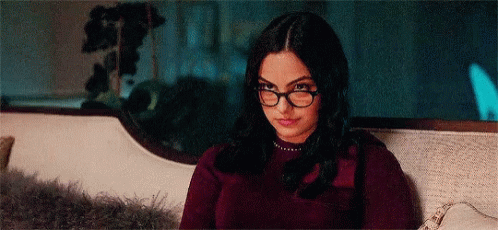
Bisous, Bisous... Votre Auteur.
#Code Word Jeronica#riverdale#veronica lodge#jughead jones#long post#very long post#many words#archie andrews#cheryl blossom#jeronica#vughead#Riverdale Analysis Auteur#cw riverdale#Riverdale Season 1#Riverdale Pilot#Riverdale 1x01#Riverdale 3x11#Riverdale 4x19#Riverdale 5x04#Riverdale 5x11#Riverdale 6x15#Riverdale 7x01
12 notes
·
View notes
Note
this is only so helpful but, from someone who's been through something similar enough (sick parent, there's [for me] plenty of love there but god do you wish everything hadn't needed to be about them sometimes, relief that they aren't suffering, maybe some anger [at them/the world/whatever], the sadness and grief, Everything)
you're allowed to have every single one of those feelings or none of them at all, you're allowed to need time and distractions, when you get there you're allowed to be happy even when you don't feel like you should be
we don't know each other but i promise you, it sucks and it'll continue to suck for a while but it does get better, you learn how to live with and around those feelings until one day you wake up and realize that even though there might still be some pain, things are genuinely okay and still getting better
It has been extremely helpful to hear from people who've been through similar circumstances, to not feel like I have to explain decades worth of context and why things were so complicated, I can just say, constant chronic pain doesn't often make people kinder, and you know. That giant tangle of feelings about how you know they didn't ask for it, but god everything had to be for them, so that it swallowed up your life, too, and you'd do it, you stayed with them until the end, you gave everything you could, but god sometimes it was so hard and it's normal to feel relief for them and yourself, but you feel like you have to justify it if people haven't been there, if they don't know what it entails, how all consuming it is.
Thank you for reaching out--for everyone who has reached out and shared a piece of their story about how they've been in a similar position, of loss and understanding of the relief of the end of pain, of understanding how hard it was to be in the caretaker position, watching helplessly and being consumed by it just as much as they were--it does help to not have to explain things, because I never knew where to start, how to even begin to talk about it.
But so many of you have just understood and that sometimes I'm still angry at the way things were but also that I love him and miss him and I'm relieved that he's in a better place now because I never wanted him to suffer and it's all one giant tangled ball of love and hurt and pain. I've been talking about it with family and friends, I've been keeping busy with a lot of cleaning, I've liberally applied distractions when I need them (so don't be surprised if you see me pop up talking about comics or One Piece or something, sometimes I just can't be consumed by this anymore for awhile), but if I'm a hot mess for awhile, well, at least this time it's for an ending and a new beginning, even as scary as that is.
And anyone else who's been through this, I hope you know that there are others out there who've been here, too, and I'm sorry about what you've suffered and it's okay that it was complicated, rocky, and not always nice.
25 notes
·
View notes
Text
Why I like it: Psmith in the City
After I read and enjoyed Mike and Psmith, I interlibrary-loaned the rest of the series and read them in rapid succession.
And honestly, my greatest appreciation for this book came during rereads and the need to overanalyze the text for annotations and conversations with a very longsuffering Allie.
Mike and Psmith's friendship comes about in the first book, and we get to see how much Psmith is willing to sacrifice for his friend, but their connection really comes to the forefront during Psmith in the City.
There's something delightfully escapist about these two friends rooming in Psmith's luxurious flat, braving the drudgeries of their shared misfortune of working at the bank by day, and living it up in Edwardian London by night. It's a setting that feels very real--and it was! Wodehouse peppers the narrative with real locations, and when I was in London, I was able, using this information, to take a little private walking tour of Psmith's part of town and experience it. Even with the reality of the locations, though, there's a certain glamorization. Thanks to Psmith's father's money, the boys are able to afford an experience of young adulthood and a first job that isn't available to most people, either then or now. And perhaps there's some glamorization of the friendship too.
Because it isn't easy to be Psmith's friend, and this starts to be evident. Psmith is a jerk in a lot of ways in this book, more so than in the others--even in his interactions with Mike. But these moments are easily brushed aside, and the friendship never really suffers. This is a Wodehouse novel, so we can be confident that when things get really bad, Psmith will come through as the good friend that he really is, and he'll find a way to save the day for Mike. The worst of his behavior vanishes by the last part of the book, never to be seen again in how he treats his best friend. Not especially realistic, but it is compelling. A real-life Psmith would be absolutely dreadful to put up with; the page, however, allows us a distance that assures us that despite it all, his intentions are good and he himself is good at heart.
And on the whole, he is. We know this because he really does care about Mike, because he's capable of dropping the flippant mask to show compassion when the situation requires. He's just...a complicated mess here. He's under a lot of stress that he hides most of the time. He's angry at his father and taking that out on his awful boss. He's an arrogant rich kid with more money than is good for him. He has one (1) and only one friend whom he's clinging to like the only thing keeping him afloat in life. (Psmith's got attachment issues, I'm starting to realize. That may be another post.) He's a very complex character, not just the comic relief or the trickster archetype, and because of that, he goes beyond hilarity to being interesting, even if he's not always easy to like.
Mike is still the everyman, perhaps even more so because his story is such a relatable portrait of what it's like to be eighteen, fresh out of school, and having to take on for the first time an adult world that you're unequipped for. Mike's classical education and cricket skills aren't particularly useful now that he has to make a living. The former class clown and jock is now an awkward mess of social anxiety. Wodehouse pokes as much fun at Mike as he does anyone else in the story, but he also takes Mike's struggles and pain seriously--because much of it was probably his own. Mike's grief at losing the glorious future he was promised, his increasing frustration and despair at being trapped in a dead-end job that stifles his talents and personality--they're very real, and poignant.
Mike and Psmith may inhabit a glittering dream world in their version of London and maintain a desirably close friendship that would have probably fallen apart eventually if it existed in the real world. Their shenanigans are sheer comedy with no grounding in reality. But the heart of the story is two eighteen-year-olds on their own in the adult world for the first time, with no support system but each other, trying to figure out life and often failing--and this is what makes the story resonate, because we've all been there.
And sure, their ending is a fairy tale, down to the final lines in which Mike imagines his future as pretty much perfect from now on (which will not turn out to be the case!), but...well, when you're a twenty-something in your first non-college job, taking the bus, feeling incompetent, dealing with difficult coworkers...a fairy-tale ending alongside a true friend is pretty appealing.
#Psmith Pseptember#I RP'd Mike on another social media site for a few years and the City plot was mostly the same year I worked in a public library#and maybe it was silly but playing that character helped get me through that year#I loved having another life to imagine in obsessive detail
14 notes
·
View notes
Note
"Definite misphrasing there - I said “good and pleasant” as in “is not dark and hopeless.” Which given the comics’ plot issues is near impossible as I also said." Are you like JulietWhiskey in that you believe that any attempt to engage with comics material will end with Azula dead or in jail & de-bended for life since it is next to impossible to redeem a child kidnapping terrorist? Especially when the writers are using Azula's apparent schizophrenia to say she is too crazy to be reasoned with?
The short answer - no, because I completely forgot about the Dragon Empress series which isn't completely dark and is working towards a good ending. So clearly you can do things with the comics material.
(But why would you when it's so bad?)
The long answer is that it's complicated. Keep in mind that the Azula of the comics is flat out OOC compared to the original Azula - and she's not the only character who gets this treatment. Even in "The Promise," which is one of the less objectionable comics, there's the whole "Zuko asking Aang to kill him if he messes up and Aang agreeing" debacle. So I - and quite a few other people - tend to treat them as completely non-canon material, or at the very least tenuously canon. So why bother?
There's also the matter of her schizophrenia - as you correctly pointed out, the writers are trying to use it to paint her as "crazy" and impossible to reason with, and as such the portrayal is both ableist and poorly written. In canon there is also nothing to prove that Azula even has schizophrenia in the first place - the prevailing theory, and the one that I subscribe to, is that she was going through a stress-induced psychotic break, which is not permanent. And, at least for me, I don't see how it's possible to maintain continuity with the terrible schizophrenia writing without spirit or brainwashing shenanigans.
Also, the course of Azula's arc in the comics is clearly intended to paint her as being completely irredeemable. Is this true? I don't think so, and I don't think @julietwiskey1 does either, though I don't know their exact opinion on this - but what it does is make Azula into a world-class terrorist threat and someone who, if found, would probably immediately be killed or de-bended without any hesitation. So any post-comics arc for her becomes a case of her being a fugitive - probably for life, unless some extreme luck or other things happen - which is neither conducive to her redeeming herself or to her finding peace in general. And unless I want to write something that deals with this inherent darkness, as well as all the other issues, I'm going to throw the comics material out a window and call it a day.
So, is it possible to write a good post-comics Azula arc? Yes, but I and the vast majority of people I associate with aren't going to try to deal with the abysmal writing and general pain of trying to use that material.
Hopefully that answers your question.
19 notes
·
View notes
Text
Kriegsmesser
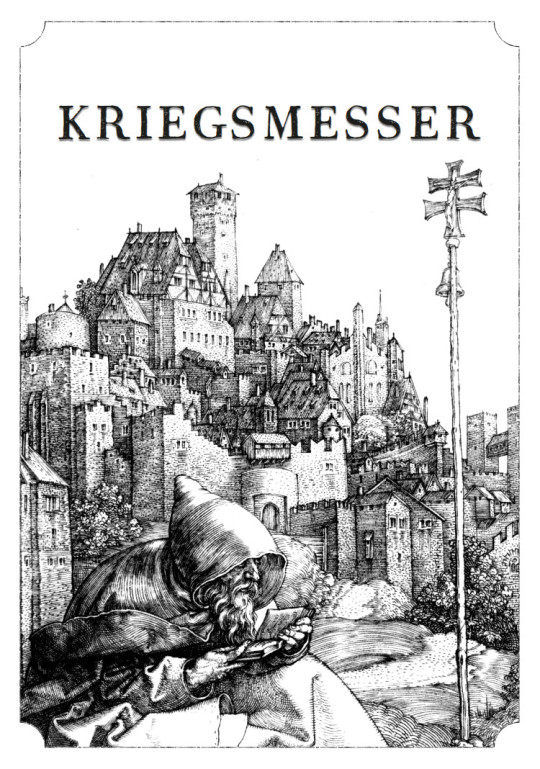
When I received Kriegsmesser in the mail I finally googled "kriegsmesser", and found out it meant "war knife". Which makes sense; Gregor Vuga's ZineQuest 2021 project is a tribute to "roleplaying games named after medieval weapons".
I love Warhammer Fantasy Roleplay's piss-renaissance Old World setting. I tend to pick up WFRP-a-likes sight unseen:
Warlock (quality);
Small But Vicious Dog (yesss);
Zweihander (which I have come to hate); etc.
Anyway: I backed Kriegsmesser without really knowing anything about it. So Kriegsmesser surprised me.
+
Kriegsmesser grew out of a Troika! cutting. Its 36 backgrounds are compatible with that system: each come with a couple of lines of description; a list of skills and possessions; an a visual cameo cropped from actual 16th-Century woodcut art.
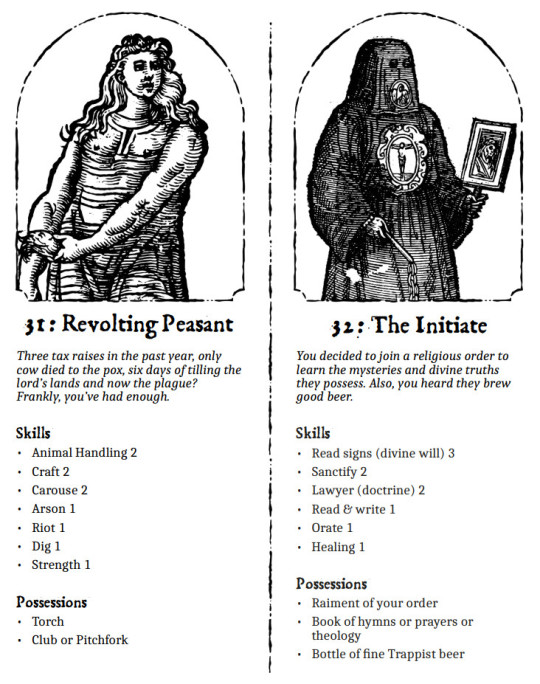
Cohesive and competently flavourful. My favourite is the Labourer, who always starts with "an empty pine box":
"You've spent your life breaking your back, working hard for other people's profit. You have nothing to show for it but a spectre of the future."
(The obligatory ratcatcher-analogue , called the Vermin Snatcher, is here -- check that box!)
+
Kriegsmesser also comes with its own ruleset. Hits all the notes it needs to, with lots of orientation and advice for how to run a game -- but ultimately super-simple, mechanically:
Roll d6s equal to the value in a relevant skill, look at the highest result. 6 means you get what you want; 5 or 4 means you get what you want, at a cost.
It's not quite a dice pool, since only the highest result matters. No opposed tests.
+
Kriegsmesser intends to have this base mechanic handle fights, too. The combat rules - with armour, toughness and weapon values -- are nested in an optional section.
For a WFRP-a-like, this feels like a purposeful departure.
Many of WFRP's most celebrated adventures are celebrated for bits that their underlying ruleset does little to support: the investigative structure of "Shadows Over Bogenhafen"; the complicated timetable of "Rough Night At Three Feathers".
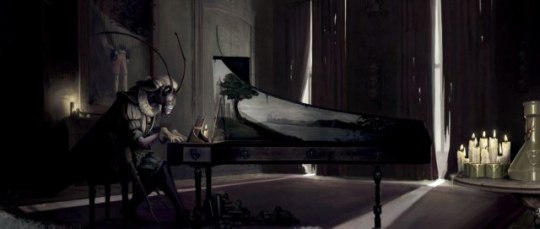
Ludwig von Wittgenstein never needed a statblock to be memorable.
Not to say that lethal, hyper-detailed fights isn't super Warhammer-y. (Kriegsmesser includes an injury table, broken down by body-part -- check that box!)
But here it feels like Gregor is saying: "I'm not Games Workshop and Roleplay isn't an ancillary of Warhammer Fantasy Battle; we can evoke grim-and-perilous-ness even if we fork away from heavy combat rules."
+

It has become ritual for me to read my partner Sharon to sleep.
Sometimes I read her RPG things. The other night, after I read her Kriegsmesser's introduction --
" The Empire wages an eternal war against Chaos. Its priests preach of Chaos as an intrusion, something unnatural ... These men see Chaos in anything that does not buttress their rule. They call it disorder, anarchy, corruption. They say that to rebel against their order is to rebel against god and nature. That the current arrangement is natural, rather than artificial.
" Meanwhile, the common people look to the Empire to deliver the justice that they were promised and they find none. They look to the Empire and do not see themselves reflected in it. They look around at what they were taught was right and good and see only misery.
" Their world begins to unravel. Chaos comes to reside in every heart and mind sound enough to look at the world and conclude it is broken. "
-- Sharon remarked: "Nice one."
The RPG things I read her generally leave Sharon lukewarm. She has enjoyed a couple -- but, yeah: for many of these books, text isn't their strong point.
Kriegsmesser is the only time I can recall Sharon praising the writing of an RPG book without my prompting.
Nice one.
+
That introduction surprised me. It underlines Kriegsmesser's biggest departure from its WFRP-a-like pedigree: how it characterises Chaos.
Corruption, a mainstay of most grim-dark-y games, is made an optional rule, like combat. Explaining this, Gregor writes:
" Kriegsmesser partially subverts or deconstructs the traditional conceit of Warhammer where the characters are threatened by the forces of Chaos. In this game it is the player characters who are the agents of 'Chaos': they are likely to become the 'rats' under the streets, and the wild 'beast-men' in the woods bringing civilisation down. It's the Empire and its nobles and priests that are corrupt ... "
Describing the Empire, Gregor writes:
" The Empire encompasses the world yet is terrified of the without. It enforces itself with steel and fire yet considers itself benevolent. It consumes the labour of others with bottomless hunger yet calls its subalterns lazy, or wasteful, or greedy. "
Holy shit this is the first time I've seen the word "subaltern" in an RPG thing, I think?
I love this.
+
Rant incoming:
With every passing decade Warhammer abridges its Moorcockian roots more and more; nowadays it is "Order = Good" and "Chaos = Evulz", pretty much.
Gone are the days when chaos berserkers are implied to grant safe passage to the helpless (because Khorne is as much a god of martial honour as he is a god of bloodletting);
Or that the succor of Papa Nurgle is a genuine comfort to the downtrodden;
Or that Tzeentch could unironically embody the principle of hope, of change for the better.
As Chaos is distilled into unequivocal villainy, Order goons get painted as Good Guys by default --
Giving rise to Warhammer's contemporary problem, wherein fans are no longer able to recognise satire.
+
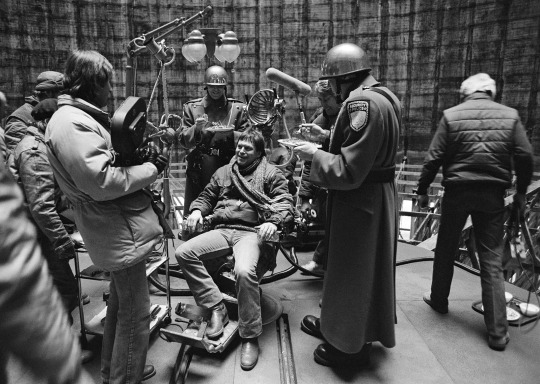
When I was introduced to 40K, it seemed pretty clear that the Imperium was a Brazil-esque absurdist-fascist bureaucratic state: planets are exterminatus-ed due to clerical error; the way it stamps out rebellions is the reason why rebellions begin in the first place.
Tragi-comic grimdarkness. That was the point.
Nowadays that tone has shifted -- and you're more likely than not going to encounter a 40K fan who argues that the Imperium's evils are a justified necessity, to prevent worse wrongs.
We went from:
"Space Nazis because insane dumbass fuckery, also chainswords vroom vroom rule of badass!"
To:
"Space Nazis because it makes sense actually, and also chainswords make sense because [insert convoluted rationalisation here]."
+
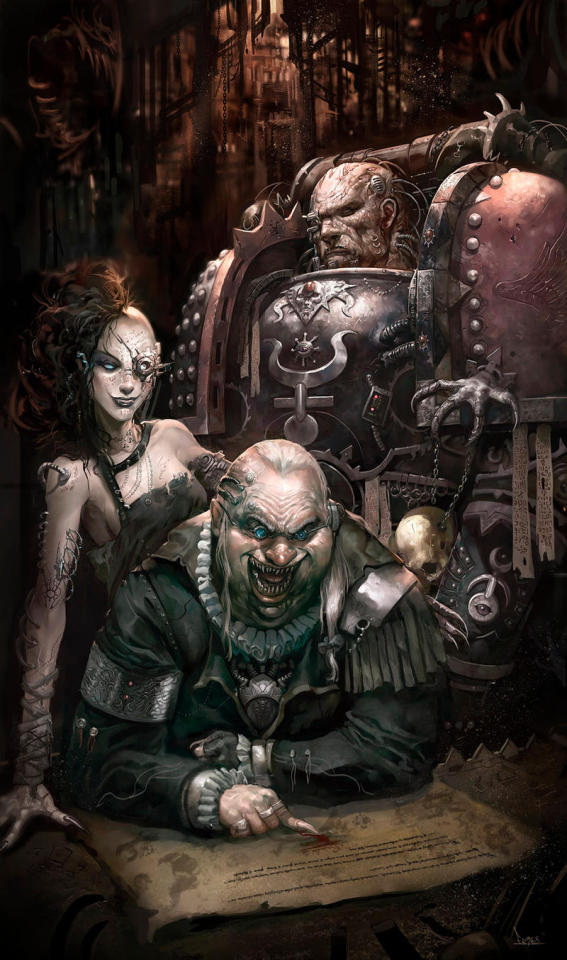
Even Fantasy Flight's Black Crusade line, which ostensibly offers a look at 40K from the perspective of Chaos, never truly commits to its conceit.
With prep you could play a heroic band of mutant freedom fighters, resisting the tyranny of the Evil Imperium --
But I don't remember Black Crusade giving that kind of campaign any actual support. Its supplements service the relatively more conventional "You can play villains!" angle; the Screaming Vortex is a squarely Daemons-vs-Daemons setting.
+
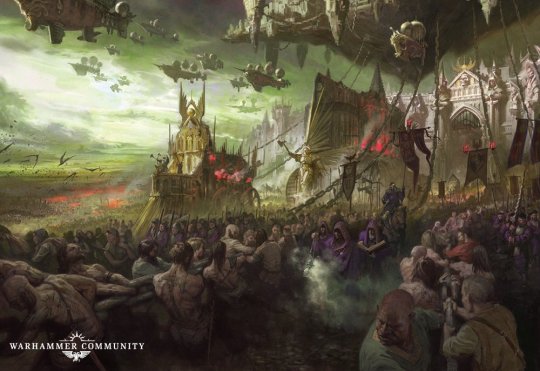
This tonal drift culminates, in my mind, with Age of Sigmar, Games Workshop's heroic-fantasy replacement of the old WFRP / WHFB setting.
Here's the framing narrative for AoS's recently-launched Third Edition. Let's see whether I've got things right:
A highly professionalised, technologically-superior tip-of-the-spear fighting force (the Stormcast Eternals);
Backed by an imperialist military-industrial complex (Azyrheim);
"Liberating" rich new territories (Ghur) for exploitation by a civilised settler culture (Settlers of Sig-- I mean, Free Cities);
Justified because the locals are irredeemable heathens (Chaos and Kruleboyz).
I mean, that's a sweet-ass Warhammer setting. It's contemporary, laser-guided lampoon. Except it is played totally straight.
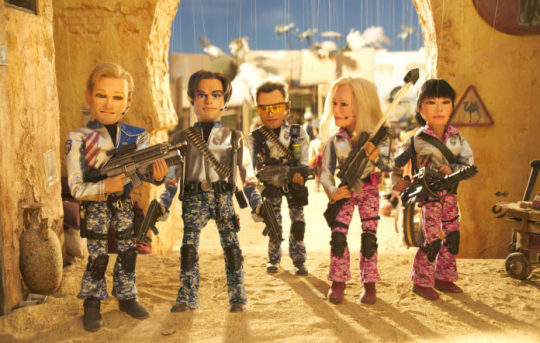
In AoS, a literal crusade is justified as the moral good.
+
I think Kriegsmesser surprised me because its framing of Chaos -- as a promise, as the light of hope shining through cracks of a broken world --
It feels so fucking right.
Yes: its a subaltern deconstruction of the conventional moral universe of Warhammer -- but it is a take that is also already implied / all but supported in the various depictions of the setting: from WFRP to the modified title-crawl of Black Crusade.
I'm annoyed I didn't think of it, myself. Damn you, Gregor!
And I'm annoyed that more Warhammer fans aren't thinking it, also.
+
lmagine if Kriegsmesser's perspective stood on equal standing as the GW orthodoxy. Imagine if, instead of simplifying stuff into "Order = Good" and "Chaos = Evulz", GW did a Gregor Vuga.
You'd have a Rashomon-ed Warhammer, where villainy depends on perspective:
You are fearful villagers, huddled around your priest, muttering prayers against the wild braying coming from the trees beyond your gates.
You are Aqshyian tribeswomen, defying the thunder warrior towering over you, the foreigner demanding you bow to his foreign god.
You are a Tzeentchian revolutionary cell, desperately trying to disrupt a Inquisitor's transmissions so your home planet isn't destroyed by fascist orbital fire.

+
Get Kriegsmesser HERE.
+++
( Image sources:
https://theenemywithinremixed.wordpress.com/2021/05/21/thoughts-on-the-4e-death-on-the-reik/
https://www.criterion.com/current/posts/59-brazil
https://www.deviantart.com/faroldjo/art/Warhammer-40k-Black-Crusade-273596035
https://www.warhammer-community.com/2021/06/09/fancy-a-new-life-bringing-order-to-the-mortal-realms-join-a-dawnbringer-crusade-today/
https://www.nme.com/blogs/the-movies-blog/team-america-15-anniversary-south-park-2558750
https://commons.wikimedia.org/wiki/File:Palestinian_children_and_Israeli_wall.jpg )
55 notes
·
View notes
Text
90 Days, part 7
Thomas Hewitt x reader
* Updates on Thursdays *

Day 40
Over a third of your allotted time here had passed, and you were just now getting the hang of folding fitted sheets.
"There, I said you could do it," Luda Mae encourages, patting your small pile of folded sheets with pride.
"Well, given enough time I suppose anything is possible," you laugh, "not to mention I had a good teacher. I appreciate it."
She smiles, and might even look a little misty-eyed.
"You know, dear, when I asked you to stay with us I wasn't sure what to expect. I saw some potential, and I had some hopes... but I believe it's safe to say you've already exceeded them. And that scare with Thomas... I'm just glad you're here, that's all. I know it was rough, given the circumstances, but I hope you're glad too."
You give that some thought. 'Rough' was putting it mildly, but it's true that things had mellowed significantly since then. Yes, Hoyt was a piece of trash and you didn't care one way or the other for Monty (who mostly avoided you; potentially having seen the bloody results of your various clashes with Hoyt), but you liked Luda Mae, and Thomas...
Well, that was a bit more complicated, and honestly you've been avoiding thinking about that too much.
"I think so. The circumstances are... odd, sure, but I'm glad I got to know you... and Thomas," you add, dreading the look she was going to give you when you said it. You're right - that quasi-smug expression crosses her features, mixed with genuine joy.
Then the screen door slams as someone enters, cutting off your conversation. Speak of the devil - it's Thomas, and he seems to be in a hurry. He also seems to be holding something, you notice. He rushes straight over to you and holds out his cupped hands urgently.
There's a kitten, already very small but dwarfed further by the large man holding it. It looks young; its eyes aren't even open yet.
You gasp, reaching out to take it from him. He transfers it to your smaller hands, looking relieved, as if he was worried he might accidentally hurt it.
"Where did you find this? Was it alone?" You ask, petting the little thing. It wiggles and starts mewing. Thomas nods. "Hmm. This is tricky, Thomas," you start, not wanting to worry him, "It's really young; they can't be without their mother at this age. You're sure you didn't see any other kittens? A cat?"
He shakes his head, concern crossing his features. You pat his arm soothingly - the kitten starts crying loud now that you're not petting it anymore. You laugh.
"It's lively, that's good," Luda Mae chimes in, "must not've been alone for long. Do you think..." she trails off, looking to you, "he'd better put it back where he found it for now?"
Thomas looks like he can't believe the suggestion. He looks from his mother to you. You bite your lip in indecision.
"She's right, actually, Thomas," you start, and the betrayal on his face would be comical if it wasn't so heartrending. "In case the mother was in the process of moving her litter and just hasn't gotten back for this one yet. We want to give her time to find it," you explain gently, so that he understands you're not just being heartless.
The shock leaves his expression, but the concern doesn't - he starts fidgeting with his hands, clearly ill at ease with returning such a little thing to the wild without any protection.
"We'll keep checking on it, and in the meantime we can get some things prepared in case we need to take care of it," you offer, and then look to Luda Mae, "if it's okay that I take a break with the sheets."
"Of course," she says, waving away your concern. "Go put it back now, Tommy. You trust our guest, don't you?"
He nods immediately, and your heart warms.
It isn't easy to keep Thomas from checking on the kitten every five minutes. You explain that the mother will be too afraid to come get the kitten if people are hanging around, and he needs to give it time. You promise to go back before dusk, when the more dangerous animals come out.
In the meantime, he helps you find things you would need to care for such a small kitten. A box, a heating pad, even some bottles you might be able use for feeding. It's not perfect, and it certainly would have been nice if there were a pet store around, but you figure you can make due with what you've gathered.
You hope the mother comes back. You know a kitten that small is a big commitment, and that they don't always make it despite all the work you put in. You don't even want to bring it up to him; you certainly don't want him to experience it.
However, when you go back to check just before nightfall, the kitten is still there, mewing in discontent. You sigh. This will mean a difficult discussion, and possibly a difficult couple of weeks, but you can't help but smile at how excited Thomas seems, and how cute the little thing is.
You take it back to the house and set up its makeshift bed. Luda Mae has managed to find some goat's milk and some more suitable bottles, so at least you seem to have everything you need.
You sit across from him on the floor and show him how to warm up the milk and feed the kitten, and then how to keep it clean and help it eliminate. When it's all cared for, you lay it in his hands and let him hold it. He strokes down its back gently with the backs of his fingers.
Watching him, you start smiling. You still need to warn him that this could end badly, but you decide to cross that bridge tomorrow.
173 notes
·
View notes
Text
PART 2
The Advocate
While his teaching career has varied, possibly one of the best examples of Gambit at his absolute best has been as a supporting character to Laura Kinney. In X-23 (2010) by Marjorie Liu, Gambit volunteers to supervise Laura in her solo adventures away from the X-Men while she is dealing with her trauma. Remy is there to be a non-judgmental, supportive, caring, advice-giving mentor. He’s an almost parental figure to her, yet respects her autonomy. During this time, Remy is working on forgiving himself for his own past, which helps him model the same self-acceptance for Laura. This is a Gambit who has gone through hell after his transformation into Death at Apocalypse’s hand and as a result has gained a deep emotional maturity we didn’t see in him as often prior to his return during Messiah Complex.
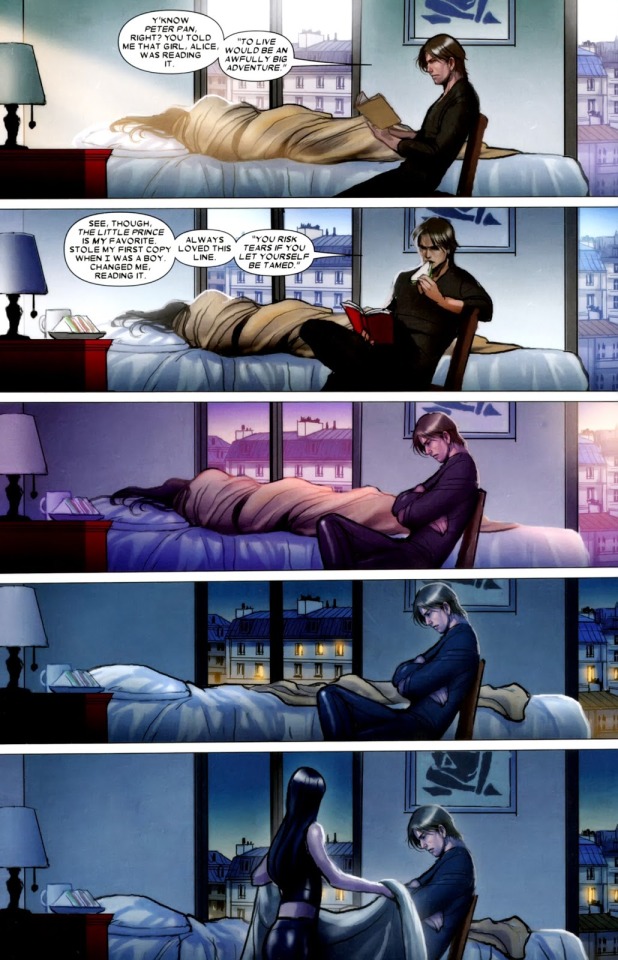
The Family Man
In the early 90's, we come to learn that Gambit is a character who cares deeply about family. As an orphan, he hasn’t always had family in his life. So both the Thieves Guild and the X-Men serve as his found family. We see this in his first miniseries, Gambit (1993) #1-4, and also learn that settling down to establish his own traditional family is something Remy idealizes and had planned for himself at one time.

Later on, depowered and in the aftermath of a near-death experience in X-Treme X-Men X-Pose (2003) #2, Remy hints that he may just be ready to settle down with Rogue.
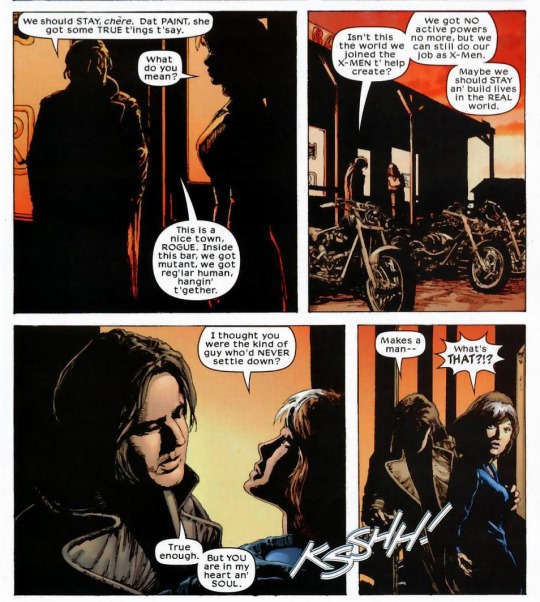
This is further established during X-Men: Legacy when we get Remy’s famous harbor speech to Rogue, where he confesses that she’s it for him. They spend some soul-searching time apart for many comic years, but after the Rogue and Gambit miniseries (2018) they reunite and we finally see the payoff in X-Men: Gold (2018) #30 when Gambit and Rogue get married.

In Mr. & Mrs. X (2018), Gambit and Rogue are working through the complications of their impulsive superhero marriage all while running missions on their interrupted honeymoon, dealing with Rogue’s power control challenges, hosting parties, trying to escape Mojo, and dealing with an unruly Thieves Guild. We see Rogue and Remy serve as rescuers and caretakers for Xandra, the secret perception-warping child of Lilandra and Xavier, proving they might just have what it takes to be parents.

We also get some major insight into what may be on Remy’s mind in this regard, as he retrieves what appears to him as a baby, but ends up being revealed as Spiral’s soul which curiously appears differently to different individuals.

By the end of this run, we know that at least Gambit seems hopeful for the possibility of parenthood someday and Rogue is at least open to considering it eventually.
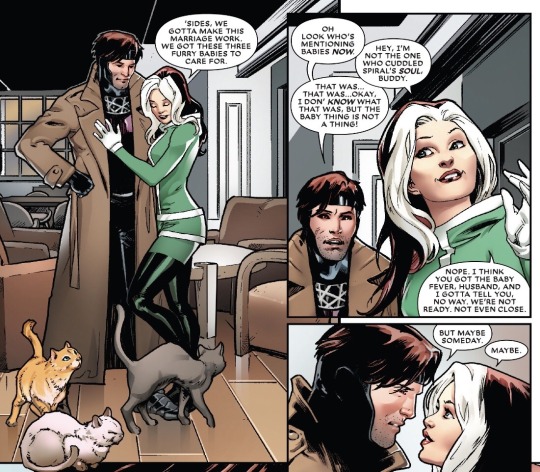
Parenting Potential
Believe it or not, in alternate timelines and “What If” scenarios, we already have seen Gambit as a father.
Probably my favorite examples are found in Claremont’s X-Men: The End (2006) and later in his GeNext, which seem to extrapolate from where his X-Treme X-Men left off. In this theoretical future, Gambit and Rogue are married and have two children, Olivier and Rebecca. We see glimpses of a Gambit who is very hands on in playing with and training his young children. Later on after Rogue is killed, in GeNext we see that his daughter is closer to him and has trained more in his skill sets, while his son has become somewhat estranged for a time.
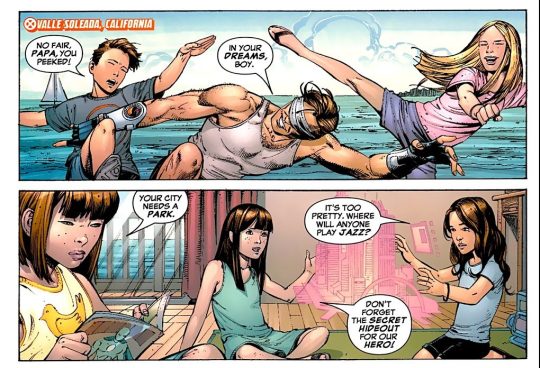

We can also thank Kelly Thompson for the recent tease in her Captain Marvel: The End (2020) where Carol returns to a decimated Earth and meets the children of many of Earth’s heroes, including Irene LeBeau, Rogue and Gambit’s future daughter who has taken on the mantle of Rogue. She has Rogue’s white streak and Gambit’s eyes. Consider my heart melted!

So while we've seen these hints and promises from brief theoretical future realities, what about the 616?
If you aren't part of the Summers-Grey "first family" or the ever expanding Wolverine clan, it seems like all bets are off for seeing any of the A-list X-Men with 616 kids. Modern superhero comic writers and editors alike continue to have negative attitudes toward both marriages and children for comic book characters, feeling they make for dull storylines and/or complicate the timeline. Nevermind the potential for added emotional depth and conflict that other comics have successfully capitalized on. Really it just seems like a huge lack of imagination and creativity on their part to me.
At any rate, if you've been following Excalibur it seems unlikely we'll see any change on this front for the foreseeable future. All signs point in the opposite direction, in fact. Perhaps we'll at least see Gambit in some kind of mentoring or training capacity in the upcoming Children of the Atom though. When comics return, I'm eager to find out.
I remain hopeful that someday we'll get some 616 stories about those mischievous LeBeau kiddos - picking locks, sneaking around, getting into fights, and generally finding trouble. With parents like Rogue and Gambit, I would expect no less! For now … well I waited nearly 30 years for a wedding … so I guess I can wait a little longer for some kids
396 notes
·
View notes
Note
About that post from a few weeks ago about not expecting gay representation in superhero stories, recently DC published a story in which one of the Robins (Tim Drake) dates a boy :)
Hello Anon,
congratulations for you having found a superhero story with themes you enjoy ^^ (I honestly mean it. Maybe many superhero comics, in fact more their style of story telling with in the medium of comic books and their premise, aren't my cup of tea yet for those who enjoy them, that's good news when your favourite stories can be even more enjoyable.)
As I read never DC or Marvel comics since years, I can't comment on anything in depth but the Marvel movies.
So, at this point a differentiation is needed. Whereas the multiple universes and time lines of comics allow for small spin-offs and more in depth explorations of various themes the super hero movie series have serious limits, if not active aversions against topics located in social discourse.
(Like, Black Panther is perhaps the most daring movie theme whereas still painting the antagonist with a desperate cause in the wrong and painting a complicated discourse with the soft brush of simple sides-division in the Marvel-paint-by-numbers-movie-set.)
The movies, their marketing, and target groups are not the same as the comic book audiences, especially when it comes to certain stand alone super heroes and their stories bearing the brand of different genres. By example, Ms. Marvel is directed towards younger readers, treats topics which are more acute to them, whereas Aja's Hawkeye is a more melancholic story about and adult struggling with daily life for an older audience. The comics do treat the Jewish identity of some Bat family members, or the Maximov-twins, Magneto, or Kitty Pryde, or do have openly gay couples. The comics are very different beasts than the movies as they became so used to their protagonists simply having superpowers by default so they can dive into less fantastical yet not less significant other topics.
If I'm not mistaken the post you're referencing was targeting the Marvel-movie machine as these are usually my superhero story telling qualms...
The movies on the other hand, are produced with a continuation demanding continued interest and, of course, most importantly, a financial revenue in mind, justifying such large productions.
The guarantee of a large financial result means to get an audience as large as possible, an audience remaining loyal so far as possible, comes only with the security that the movies do not drive any large portions of the audience away. Meaning, no largely controversial topics (again, for a formulaic Marvel movie, Black Panther was close to daring...), nothing other people would argue about.
By example, whatever we may personally like or dislike about TLJ, none could argue Rian Johnson wasn't trying to be a bit more innovative in the saga. But it wasn't the same old formula so the fans tore Johnson, Kelly Marie Tran,the movie itself, and each other into shreds.
Or, no matter what you thought about CMBYN, that fact how much of the backlash of the movie (in the US) wasn't anything substantial about movie craft but sheer antagonism against a public display of a homosexual relationship. The backlash against homosexual depiction in movies is to this day extremely prominent. The movie was successful but it was subjugated under homophobic reactions.
Now pair prominent homophobia with the example of franchise formulas being stirred up, now you have maybe the chance for a more layered whereas also less financiall promising movie.
It would also be wrong to scapegoat as more conservative people because Marvel movies get rewarded with repeating their formula over and over again. No matter if you're full on in favour of LGBTQA, or get worked up if two people of the same gender making even eye contact, every ticket, every paid stream for an (social topic) unchallenging Marvel movie is another sign for the current state of Marvel-productions to keep on writing the most sexless stories distributed on large scale. Because this formula repetition brings no financial decrease.
2 notes
·
View notes
Text
How to write yandere without making it into a basic bitch anime

-First of all, this is not a healthy relationship in any terms but it is very alluring tbh. this actually is one of my guilty pleasures is to read yandere fanfiction! 😥😄 and the yandere is basically a Japanese term, an anime trope, for someone who is obsessively in love with someone.
-Intensity is a good thing in a romance... But yandere they turn it up to 11! There's a fine line between having very intense scary love and having a comical intense love writing a yandere. A very intense yandere will be very literal with what they say, like say "I would kill someone for you" and then they literally kill someone for the person. But a comical approach would be like if they said "I will kill anyone for you" and then not do anything, instead doing more subtle things like they just want love instead of possession.
-Make the yandere attractive in more senses than one. Being physically attractive does not mean people will automatically fall in love with you. Make them charming with personality! The reason people are so attracted to the concept of yanderes is because they're just so smart, calculating, and charming so don't make your character short on any of those things!
-Make your character smart! These characters are on the cusp of doing very illegal things for love, I don't think they're just going to do it and get caught not being able to act on their love. Always make them one step ahead of everyone and don't let them be blind to the facts of the character they're attracted to.
-give them reason to be attracted to the character they're attracted to. An easy anime trope is that they had a childhood promise that they would be married to each other, which in my opinion is very stupid, and they just fall madly in love with them for years. Don't do that! they fall in love with the character they're in love with because they remind them of something that made them happy when they were younger, they like the idea of the person not really the person but the happiness they think that person will give them, or friends for a while and then one day they just started to like them and it slowly progressed to this possessive obsessive thing.
-The love does not always have to be one-sided! People in the real world like to be taking care of and controlled. Which some people don't understand but is a real thing. So, if you're going to make a romance out of this that isn't thriller but more actual romance, make it more than one sided. Maybe the other character likes it too but wants to make it healthier or maybe not at all. Get messy and dirty in this, this is a complicated and twisted real life thing and you should make it as twisted and realistic as possible, people aren't always black and white with what they feel.
-if your yandere kills people, DON'T MAKE THEM CLEAN OF WHAT THEY DID! THEY STILL MURDERED SOMEONE AND PEOPLE NEED TO PAY THE CONSEQUENCES FOR THAT; END OF STORY! Seriously though, if someone was murdered people are going to look for the murderer and even if your yandere is the smartest person in the world they're still needs to be at least just a suspicion that they were involved and that people are trying to investigate. AND IF YOUR YANDERE KIDNAPS THE CHARACTER THEY LIKE! THEN THERE WILL BE CONSEQUENCES, PEOPLE ARE GOING TO LOOK FOR THE CHARACTER; PEOPLE ARE GOING TO FIGHT TO FIND THAT PERSON! DON'T MAKE YOUR YANDERE SCOTT FREE!
-Give them moments of kindness and tenderness. give the moments where they're the most loving person in the world because they genuinely love another person even if it isn't fully loved but more of an illusion of love.
-give the moments to breathe. and what I mean when I say give the moments to breathe I mean that give them a moment that shows what's underneath all of the facade. Make them panic if they think that someone is leaving them, make them sob in front of the person they love, or make him so angry they punch a hole through the wall and breaking their own arm.
-If you're going to make the yandere twisted go all the way. Make them fucked up and tender. If they are twisted and torturous then make it that way, don't sugarcoat anything. Make them pull the nail off of the person they love if they try to leave them, they beat themselves up because the person they love say they love someone else and they think that it's because they're not attractive enough or they need to be punished for it, or they torture someone that the person they love care about because they're not getting their way. Make them sadistic if they're sadistic.
-The character that best shows this trait: Joe Goldberg from "You", Villianelle from "Killing Eve", (intense way) and Trent from "Crazy Ex-girlfriend" (funny way)

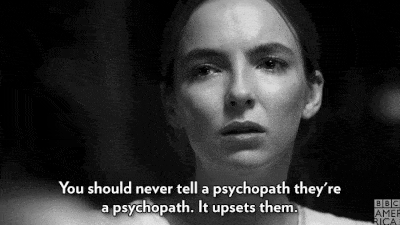
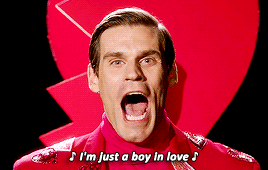
#how to write#writeblr#writing#writing advice#writing characters#how to write a villain#villain#antagonist#how to write an antagonist#how to write an anti-hero#writing tips#writing prompt#yandere x reader#yandere#yandere character#how to write yandere#yandere boy#yandere girl#crazy ex girlfriend#crazy ex gf#you#villianelle#killing eve#killing stalking
2K notes
·
View notes
Text
Falling down
Let's talk about Anakin's fall to the dark side.
As originally presented in RotS, Anakin's fall is mostly predicated on his fear that his wife will die during childbirth, and his desire to prevent that. There are hints that he also has an increasing desire for more power and status, but that aspect is mostly brushed aside in favour of the dead wife thing.
Seems straight forward enough. Guy loves his wife, is willing to cross any line to not lose her.
The problem is the movie does a very poor job of making Anakin's choices feel believable. He lives in Star Wars land! They have access to medical technology that is just bonkers. Instead of booking an appointment with the family physician to get to work on making sure Padme is healthy, and that there are no as yet undiagnosed medical issues that could complicate the birth and pose a danger to her, Anakin does none of that, and instead listens to some old fart who tells him if he just kills enough jedi children, that will get his dark side xp high enough to save his wife!

For his fall to unfold the way it does in the movie, Anakin has to have the IQ of a cheese sandwich. If he had been previously characterized that way, I'd have nothing to say, but he wasn't.
Oh hai the silly funny side of tumblr star wars fandom. I know we all enjoy posting funny comics and au fanfics and stuff depicting Anakin in various silly ways that would fit the narrative discussed above. I'm not here to take those away from you, but we all know they aren't actually representative of the film's characterization of Anakin. Thank you for your attention.
My edit is going to focus more on the power aspect. More emphasis will be placed on Anakin's desire for control, status, and power. I won't ignore his desire to save Padme obviously, and it will remain a significant factor, but I am going to make every effort to draw focus to those other things as well.
Not necessarily an easy task given the material, but through some careful editing and restructuring I think it's doable. There are a number of conversations with Palpatine where he talks about Anakin's power and position. I'm also confident I'll be able to harvest some good Palpatine dialogue from The Clone Wars to serve this purpose as well.
When Anakin finally discovers that Palpatine is a Sith lord, that sequence is going to require careful editing. If I can, I want to remove Palpatine explicitly saying he can help save Padme. That line alone should be more than enough reason for Anakin to NOT fall for Palpatine's ploy.
Here's the big problem with Anakin's fall as it currently exists:
When Anakin discovers the truth, he puts it all together. He realizes that Palaptine has orchestrated the clone wars from both sides, that he is responsible for the deaths of billions of people, for the death of Qui-Gon, that he controlled both count Dooku and general grievous, and the two most important things: that he has been lying to and manipulating Anakin his entire life, and that he is responsible for multiple assassination attempts on Padme.
Why in the name of sanity, having realized all of that, would Anakin take Palpatine at his word?
"Hey Anakin! Listen, I know I have tried to kill your beloved wife Padme a whole bunch of times, but I promise that I actually really want to help you save her life now! What? How do I know that you're currently scared that your wife is going to die? Well, I certainly don't know anything about and am in no way responsible for the horrible visions of her death you've been having recently if that's what you're implying. It's just a coincidence, you can trust me, don't be so paranoid, I'm only the dark lord of the sith, what possible motivation could I have to lie to you?"
By tipping his hand like that, Palpatine should be guaranteeing that Anakin won't join him, but instead he does. And not only does he join Palpatine, but he suddenly buys into that absurd nonsense Palpatine was trying to spin him about the Jedi plotting to take over too, despite knowing for a fact it was all total bullshit.
A lot of that stuff has to go. Palpatine isn't going to be trying to convince Anakin that the Jedi are plotting a coup, that's just too much. What he will do is plant the seeds in Anakin's mind that the Jedi and the Sith are really not that different. That the Jedi do not appreciate him, that they fear his raw power and talent, and that they are holding him back because they fear that they will not be able to control him.
Palpatine will offer Anakin a path that seems logical. He's going to say stuff that sounds super reasonable, like:
"If one is to understand “the great mystery” one must study all it's aspects, not just the dogmatic narrow view of the Jedi. If you wish to become a complete and wise leader, you must embrace a larger view of the force."
That quote is solid gold for this edit. It's perfect villain stuff because on its face it sounds perfectly reasonable, and it will feed into Anakin's suspicions that the Jedi are holding him back and not teaching him everything. Of course if you want to become a great Jedi you need to understand the intricacies of both the light and the dark. How can you fully understand the force if you only study half of it? This is Anakin's gateway.
Then Palpatine can feed into that, telling Anakin that of course he should embrace his passions, they make him stronger. Being more powerful is not a bad thing, and Palpatine can help him achieve greater power than the jedi could ever offer him. Power that Anakin will infer her can use to save his wife, which works much better than Palpatine spelling it out for him. The legend of Darth Plagueis is all Palpatine needs to plant that seed, he doesn't have to say anything more than that.
And that whole power to stop death thing should have been another moment when Anakin turned on Palpatine. Anakin discovers the truth and Palpatine offers to save Padme. Anakin turns Palpatine in, is told to wait at the temple while Master Windu arrests Palpatine. Anakin decides to go anyway, sees the dead jedi, Palpatine begs for his life, claiming he's too weak to save himself, Anakin cuts off Windu's hand, Palpatine reveals he's a big old liar who has "UNLIMITED POWER" and kills Windu, Anakin pledges himself to Palpatine in exchange for saving Padme's life, and then Palpatine is all "Oh yeah, about that... See, only one guy knew how to do that, and he's hella dead. But, if we put our heads together, I bet we could probably figure that shit out... maybe."
How was Anakin's response to that not "Are you fucking kidding me right now sphincter face? I just helped you kill master Windu and pledged myself to the dark side, and you don't even fucking know how to save my wife?" and then lightsabering his wrinkly ass into deli meat?
We can do better.
0 notes